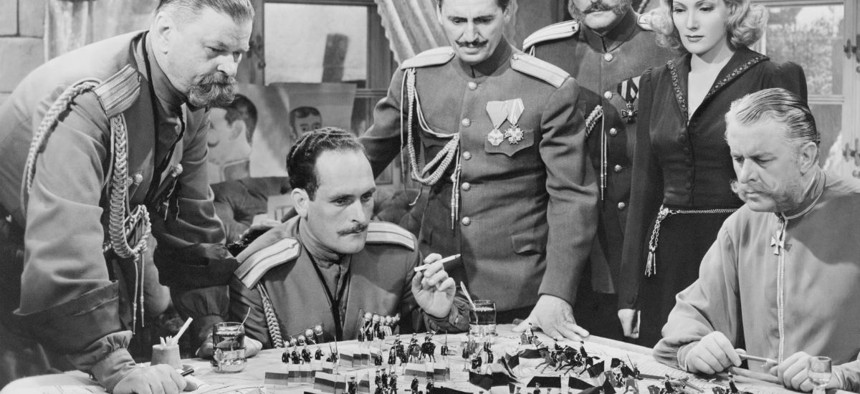
Everett Collection/Shutterstock.com
Planning Is Valuable; The Plan Much Less So
The only certain outcome is things won't go exactly as intended.
In The Art of War, the great Chinese military strategist Sun Tzu observed: “The general who wins a battle makes many calculations in his temple ere the battle is fought. The general who loses a battle makes but few calculations beforehand.”
Over a millennia later, the Prussian Field Marshal Helmuth von Moltke (The Elder) offered a different view on such planning “calculations”: “No plan of operations,” he wrote, “survives the first collision with the main body of the enemy.” Or, as Moltke’s thinking is often pithily summarized: “No plan survives contact with the enemy.”
Who is right? Sun Tzu or Moltke? Are lots of calculations the key to victory? Or, once the battle begins, is the plan irrelevant?
Actually, I think, these two conclusions are not at all contradictory. Both Sun Tzu and Moltke are right. For while Moltke’s observation concerns the actual battle plan, Sun Tzu is focused on the planning. The planning may, indeed, be extremely valuable, even though the chosen plan may rarely (if ever) work as originally conceived.
After all, there are two ways to discover the deficiencies in any plan. The first is to spend a lot of time and energy planning — thinking through all the possible consequences of each alternative, indeed of each specific component of each alternative, and then to develop ways to neutralize potential problems. The second is to start using the plan, which will quickly reveal multiple, unanticipated deficiencies. The brain trust of planners may have considered the specific causes behind many of these deficiencies to be possible but highly improbable. And they may have never even anticipated many of the others.
Once, however, something goes wrong (which Murphy says it will), what should those who developed the battle plan — let alone their lieutenants on the front line — do? They have crafted a well-planned plan. And they have started to carefully implement it. Oops! Their brilliant plan is now obsolete.
Fortunately, if the planners — in the process of developing their plan — have made “many calculations,” they are much better prepared to make some quick and intelligent adjustments. For among their multiple calculations may be one or three that reflected their prescient concern for the problem that now requires their chosen plan to be scrapped — or, at least, modified.
Sure, they originally dismissed this now significant problem as far-fetched. They failed to take it seriously enough. Still, they did consider it. They thought about what they might do if the improbable happened. Then, they forgot about it.
Until now. Until some of the specifics of their original plan were exposed as defective.
Still, having already thought about this or similar improbabilities — and thus having thought about what they might do in response — they can now modify their strategy, developing an adaptation that maintains the core concepts and key components of their original strategy while reconciling them with the new complication.
The more calculations that the planners originally made, the more likely they are to have considered the impossible that has now become an annoying reality.
Inevitably, all public executives — whether they are trying to win battles, protect the environment, or save children’s lives — must balance planning with action.
Planning demands a variety of “what if?” calculations. What should we do if this happens? What might we do if that happens? And if the room is full of clever planners — specifically planners who are ingenious enough and devious enough to invent potential problems that normal folks could never envisage — the number of “what if?” possibilities to be examined can balloon.
Both Sun Tzu and Moltke were correct. Planning is most certainly valuable — less, however, for the plan that was finally chosen than for the conscious deliberation about all of the contingencies that the team of brainstorming planners could contemplate.
For the final plan will inevitably have multiple flaws, inadequacies, deficiencies, imperfections, weaknesses and faults. But in the process of planning, the team will have — or, at least, should have — made many calculations. This planning is what prepares them to deal with the inevitably unexpected.
Perhaps the combined lesson that these two military strategists have for all public executives is: First, do a lot of planning, making the necessary calculations for the full abundance of troublesome contingencies that you (and your teenage children) can envision. Second, once you start implementing your plan, be prepared to quickly recognize that things aren’t going exactly as your original (and certainly brilliant) plan had intended. Third, don’t dither before making the necessary adjustments.
Robert D. Behn, a lecturer at Harvard University's John F. Kennedy School of Government, chairs the executive education program Driving Government Performance: Leadership Strategies that Produce Results. His book, The PerformanceStat Potential, was recently published by Brookings. (Copyright 2015 Robert D. Behn)
(Image via Everett Collection/Shutterstock.com)






